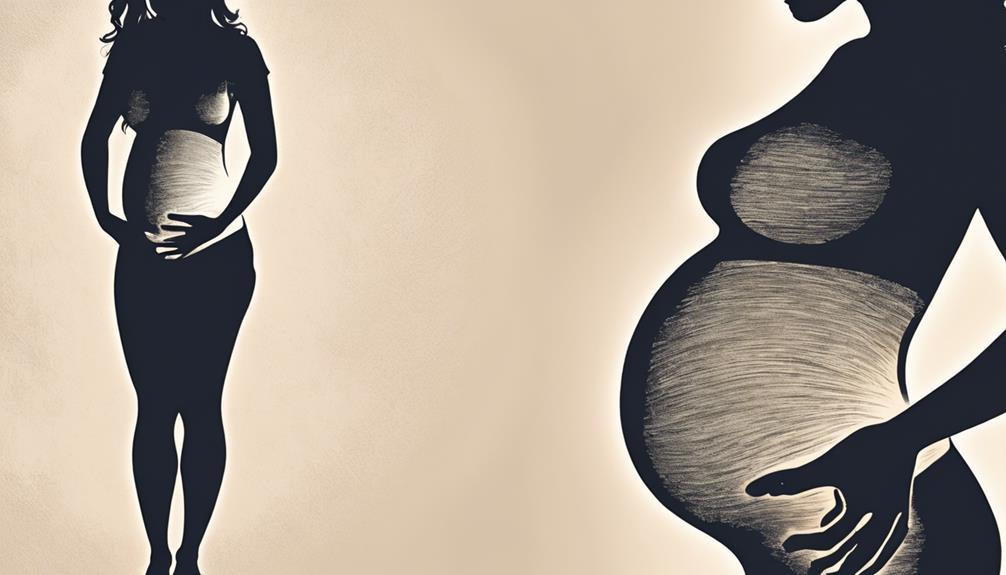Have you ever wondered if certain foods could potentially lead to a miscarriage during the second trimester of pregnancy?
While it's a topic that may raise eyebrows, the association between what we eat and pregnancy outcomes is worth exploring further.
Let's uncover the potential risks and implications of consuming specific foods during this critical stage of pregnancy.
Key Takeaways
- Avoid aloe vera products, sprouted potatoes, animal liver, and papaya to reduce second-trimester miscarriage risks.
- Stay away from foods prone to harmful bacteria like listeria, soft cheeses, and raw sprouts during pregnancy.
- Limit intake of caffeine, alcohol, and certain spices to lower the chance of miscarriage in the second trimester.
- Be cautious of consuming raw meat, raw eggs, processed meats, high vitamin A foods, and fish high in mercury.
Harmful Foods to Avoid
During the second trimester, it's imperative to avoid certain foods that pose a significant risk of miscarriage due to harmful bacteria and substances.
Raw eggs and homemade mayonnaise should be off the menu to prevent potential salmonella contamination, which can lead to food poisoning and potentially trigger a miscarriage.
Unpasteurized dairy products, such as milk and soft cheeses, must also be steered clear of during this critical period to reduce the risk of listeria infection, a known cause of miscarriage.
Canned seafood should be avoided as well since it may harbor harmful bacteria like listeria, further increasing the risk of miscarriage.
Additionally, consuming aloe vera products should be strictly avoided in the second trimester to prevent pelvic hemorrhage and uterine bleeding, which could lead to complications and potentially result in miscarriage.
Ensuring a safe diet during the second trimester is essential to safeguard against these risks and promote a healthy pregnancy.
Foods Linked to Miscarriage

Consuming certain foods during the second trimester can increase the risk of miscarriage, particularly those high in vitamin A like raw or undercooked liver products. Ensuring caution with your diet to mitigate any potential harm to the pregnancy is vital.
Here are three items to be wary of:
- Raw Meat and Liver Products: Raw or undercooked meat, especially liver, should be avoided due to high levels of vitamin A, which can escalate the risk of miscarriage.
- Unpasteurized Dairy Products: Soft cheeses and other unpasteurized dairy items should be off-limits to prevent listeriosis, a bacterial infection that has been associated with miscarriage.
- Raw Eggs: Foods containing raw eggs, like homemade mayonnaise, can harbor salmonella bacteria, posing a risk of miscarriage.
Taking proactive steps to steer clear of these foods can help safeguard against potential complications during the critical second trimester. Prioritizing the well-being of both the mother and the developing fetus by being mindful of dietary choices is essential.
Risky Foods in Pregnancy
In pregnancy, caution must be exercised regarding the consumption of risky foods that can potentially lead to complications, such as miscarriage, in the second trimester. It's essential to avoid raw meat, unpasteurized dairy products, and certain seafood due to the increased risk they pose.
These high-risk foods may harbor harmful bacteria that can trigger uterine contractions and ultimately result in miscarriage during the second trimester. Additionally, soft cheeses should be omitted from the diet as they can also contain harmful pathogens.
Ensuring a well-balanced diet is paramount during this stage of pregnancy, necessitating the exclusion of raw sprouts, unpasteurized milk, and other risky foods. It's crucial to be mindful of what's consumed to maintain a healthy pregnancy and minimize the chances of complications, including miscarriage, in the second trimester.
Foods to Steer Clear of

What foods should be avoided to minimize the risk of miscarriage in the second trimester? Here are three essential items to steer clear of:
- Raw Meat: Consuming undercooked or raw meat can increase the risk of miscarriage during the second trimester due to the potential exposure to harmful bacteria like salmonella or E. coli.
- Unpasteurized Dairy Products: Avoiding unpasteurized dairy products is vital as they may contain Listeria, a bacteria that can lead to miscarriage in the second trimester.
- Fish Consumption: Some types of fish high in mercury levels, like swordfish or king mackerel, should be avoided during the second trimester. Mercury can harm the developing fetus and increase the risk of miscarriage.
To minimize the chances of miscarriage during the second trimester, it's crucial to steer clear of these foods and focus on maintaining a balanced diet. Avoiding raw meat, unpasteurized dairy products, and being cautious with fish consumption can contribute significantly to a healthy pregnancy.
Pregnancy No-No Foods
To mitigate the risk of miscarriage in the second trimester, it's essential to be mindful of specific foods to avoid during pregnancy. Raw eggs should be off the menu as they pose a risk of salmonella infection and can induce uterine contractions, potentially leading to complications.
Soft cheeses are another pregnancy no-no food due to the potential presence of harmful bacteria. Caffeine and alcohol consumption should be minimized during the second trimester, as excessive intake can harm the baby and increase the likelihood of miscarriage.
It's vital to steer clear of foods like sprouted potatoes, animal liver, aloe vera, and papaya to reduce the chances of miscarriage during this critical stage of pregnancy. Being cautious about what we consume, including avoiding processed meats and certain spices, can help prevent complications and promote a healthy pregnancy journey.
Frequently Asked Questions
What Can Accidentally Cause a Miscarriage in Second Trimester?
We will discuss what can accidentally cause a miscarriage in the second trimester. Foods high in vitamin A, raw or undercooked meat, sprouted potatoes, pineapple, and aloe vera can increase the risk of miscarriage during this critical period.
What Teas Cause Miscarriage During Pregnancy?
Teas known for inducing miscarriage in pregnancy include pennyroyal, blue cohosh, and tansy. Consulting a healthcare provider before sipping any herbal teas is important for a safe pregnancy. Avoiding risky brews is key.
What Fruits Can Pregnant Woman Not Eat?
We should avoid certain fruits during pregnancy to lower miscarriage risk. Papaya and pineapple may induce uterine contractions. It's important to steer clear of these fruits as they can lead to complications.
What Medicines Can Cause Miscarriage?
We need to be cautious about medications during pregnancy. Some drugs like misoprostol, methotrexate, and NSAIDs can increase the risk of second-trimester miscarriage. Consulting healthcare providers before taking any medication is essential for safety.
Conclusion
To summarize, it's imperative to be mindful of the foods consumed during the second trimester of pregnancy to mitigate the risk of miscarriage.
By avoiding certain harmful foods and making informed choices, expectant mothers can safeguard the well-being of their unborn child.
Remember, the choices we make in nourishing our bodies during this critical time can have a profound impact on the outcome of the pregnancy.









